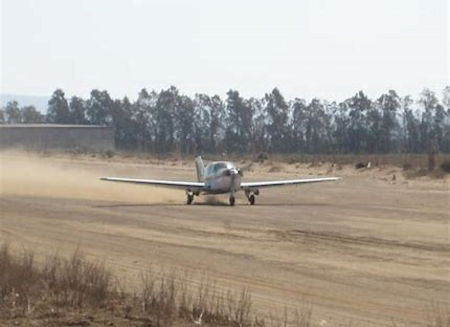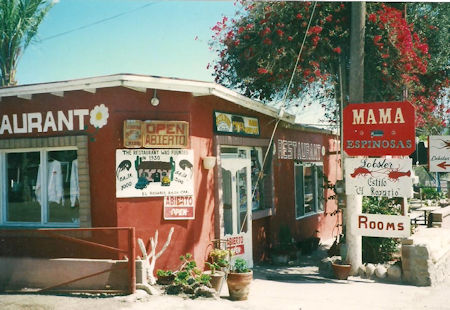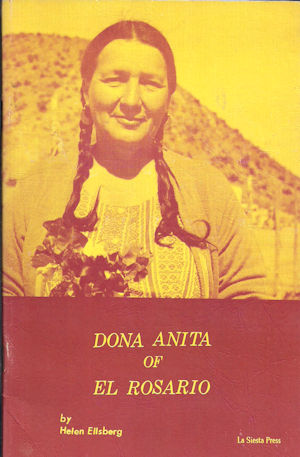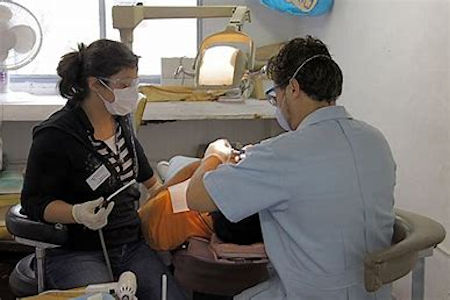 |  |
By Greg Niemann

Doña Anita (Mama) Espinoza of El Rosario, a legend among Baja travelers, is also credited as founding the Flying Samaritans, a group of medical teams that offers their expertise in remote areas throughout Baja California.
Born on Oct. 16, 1910, Anita was the youngest child of the half-French, half-Italian mining engineer Eugenio Eduardo Grosso Boitare and his wife, a Pima Indian Chief’s daughter, Tecla Pina.
Grosso, who earlier worked for El Boleo mine in Santa Rosalía, had developed copper mines throughout Baja and was working out of El Rosario when Anita was born. Over the next couple of years, the Mexican government was overthrown and bandits threatened raids scaring owners of foreign-run mines.
So he sent Tecla and the youngest children to Calexico, CA where Anita lived from 1913 to 1922, learning English in school. The family later returned to Mexico, leasing a ranch in El Rosario.
There Anita met and married Heraclio Espinoza, the oldest son of the village patriarch Santiago Espinoza. As early as 1800 one of the first land grants in the area was made to Carlos Espinoza, a retired Spanish soldier. The Espinoza family had become prominent in the fertile El Rosario valley four miles east of the Pacific Ocean, 155 miles south of Ensenada.
While Heraclio managed the family cattle ranch, Anita raised flowers and vegetables, when she wasn't raising children that is. She gave birth to 15 children. Anita opened a small restaurant “Mama Espinoza’s Place” at the entrance to town in 1930. She was the village Postmaster for 22 years, but because of her command of English, her most important role became that of unofficial greeter.
For years, increasing expeditions had been arriving at El Rosario (In 1905 only two parties, the author Arthur W. North and the biologist Nelson, made the journey; by 1927 the Auto Club of Southern California made its first trek there.).
After World War II, many more cars were attempting the difficult journey south and all of them stopped at the modest brick-red stucco bougainvillea-covered building that has hardly changed over the last 70 plus years.

Anita's guest register is filled with names that comprise the lore that is Baja. Almost all of the off-road racers, including celebrities Steve McQueen and James Garner, have signed her register.
In the early years she kept tabs on those who continued on and monitored their progress through the informal Baja grapevine. For example, her older brother Arturo Grosso owned the rancho at Laguna Chapala about 125 miles away and if someone hadn't stopped there, it was cause for concern. Contacts like that and primitive but effective communication helped them know where travelers should be.
Dona Espinoza has seen it all, including the paving of the Transpeninsular highway and the multiplying of visitors. Her succinct comments about the road are echoed by many a long-time Baja buff, "Bad roads, good people; Good roads, all kinds of people!"
Dust storm forced plane to land
She once explained to me about how the Flying Samaritans was formed. It appears the connection began on Nov. 13, 1961 when a group of El Rosario locals were sitting around a table at Espinoza’s Place while a furious dust storm raged outside. They heard an airplane; it circled and then the sound stopped.
Some of the men jumped in a truck and headed off over the rocky road to the mesa where they correctly figured the plane had landed. The twin-engine craft that was forced to put down on the rustic strip was dangerously short of fuel, having been unable to land at Tijuana or Ensenada because of the storm. Needless to say, the five shaken occupants were happy to be safe.
The pilot was Aileen Saunders Mellot, who would go on to win the world-renowned Powder Puff Derby twice. On board that day were her 17-year-old son Frank and friends Leah Hanlon, Polly Ross, and Roberta Ridgley, then editor of San Diego Magazine.
Safely ensconced in Espinoza’s Place, they were delighted to meet the proprietor, the indominable Anita “Mama” Espinoza, who immediately set about feeding the group. Then her husband Heraclio and another villager drove them about 30 miles north to Santa Maria Sky Ranch (near present day Cielito Lindo) to spend the night and pick up some aviation fuel, returning in the morning.

Mrs. Hanlon was ill, but there was no way to help her in El Rosario. Residents there had earlier built a clinic, but with no supplies or equipment, nor a medical team to staff it, it had been abandoned. Before the group departed they learned more about the difficult situation in the little village. The current drought had ruined crops and left animals to die. The village was definitely having a rough time.
Shortly after the incident, Mama Espinoza received a letter thanking the villagers for their much-appreciated assistance, and a promise to return on December 6 to bring some things for Christmas.
It was not an idle promise. “It was beautiful when they came,” said Mama Espinoza, “Nine planes formed stairsteps in the sky.”
The planes brought toys and donated Christmas gifts. A Boy Scout troop from La Jolla even got into the act by gift-wrapping every package. They brought dry food, clothing, 100 pounds of candy, and medicine. According to the San Diego Union, “It was accepted with true Mexican dignity and low gracias.”
The trip also brought a doctor/pilot, a last-minute substitute. While the others passed out supplies, Dr. Dale E. Hoyt noticed people who needed medical attention.
It started on Mama’s kitchen table
Using Mama Espinoza’s kitchen table, they hung some sheets for privacy, and the townspeople came. They used candles and flashlights for illumination. It was noted that a San Diego Union reporter held the flashlight. They didn’t know it at the time, but that was the birth of the Flying Samaritans. After treating 22 people and running out of supplies, Dr. Hoyt closed shop, but promised to return in two weeks.
He and his wife Jessie began regular trips. Then his associate, Dr. Diane Trembley, began alternating weekends. Soon other doctors, dentists, optometrists, and nurses caught the enthusiasm and began to make trips. Even craftspeople came along to help rebuild the El Rosario clinic.
By early 1962 a formal organization called the Flying Samaritans was formed in San Diego and monthly trips to El Rosario were being made. Aileen Saunders Mellot became the first president. A second clinic opened in Colonet in 1963 in facilities provided by Andy Bradley, a retired ex-pat living there.
Soon other clinics were opened in other Baja California villages lacking medical facilities. Their arrival is always anticipated by the rural bajacalifornios, some of whom make long, arduous journeys by horse, cart, or truck to get medical attention.
More clinics in other locations

The Flying Samaritans grew and expanded to 12 chapters, mostly based in Southern California but also with chapters in northern California, Arizona, and Rosarito Beach. They regularly serve over 20 clinic locations with each chapter maintaining one or more clinics.
A typical Flying Samaritan trip includes about 20-22 volunteers, each paying a portion of the aviation fuel as well as their own expenses. They each have specialized duties; most chapters have the following coordinators: Pilot/Trip, Clinic, Nurse, Optometrist, Pharmacist, Dentist, Dental Hygienist, Audiologist, Translator, and Support. One or two members fill each role on the monthly scheduled trips.
Each chapter of the non-profit organization has officers and has regular meetings, plus there is an International Conference for those more than 1,500 altruistic members of the Flying Samaritans.
In their many hundreds of air time, the organization has had remarkably few accidents, but one great tragedy took the lives of volunteers. In the early days, a plane was leaving El Rosario when a wing came off and it crashed and burned. Aboard were the hard-working Julian Burchett, the American nurse Linda Cox, and two local women, Gloria and Yoly, both Espinozas and sisters of Mama’s husband Heraclio. The tragedy was a great personal loss for those who helped get the Flying Samaritans off to a start.
In reflecting on the Flying Samaritans, the gracious “Mama” Espinoza praised the wonders performed by these selfless Americans. She once said, “The Samaritans have saved many lives, and many mothers in their delivering. They need only wings to fly and be Angels.”
Senora Anita “Mama” Espinoza died in March 2016 at the age of 105. (Some reports had her older. She told me she was born on Oct. 16, 1910, but did mention a lack of accurate record-keeping then.) Regardless, she lived to well over 100 and inspired thousands, including the Flying Samaritans.
About Greg
Greg Niemann, a long-time Baja writer, is the author of Baja Fever, Baja Legends, Palm Springs Legends, Las Vegas Legends, and Big Brown: The Untold Story of UPS. Visit www.gregniemann.com.